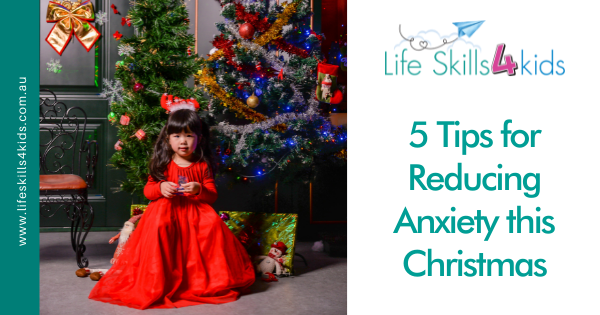Well, it’s the holiday season and Christmas is around the corner. Lights, music, yummy food and family all around. It can’t get better than that, can it? But do you fear your kids won’t feel the same? Many children are anxious about the holiday season.
You might see them complaining of nausea, stomach problems, fatigue or pain. They might be having melt downs, crying for reasons you are not aware of, isolating themselves from everything that is happening around them, over eating, and the list goes on.
These may be signs of worry or anxiety for your child. You may be wondering why they are so out of sorts when everything is supposed to be fun and happy. They might also seem anxious, scared and overwhelmed or depressed. Did you do anything wrong or is it just that time of the year?
Well don’t blame yourself, it’s just that time of the year when things are out of the ordinary. Let’s find out why the situation is so, and what we can do to make our kids: Just Right (and less anxious) for the holiday season.
Why do some kids get overwhelmed and anxious at Christmas?
Some of the general qualities of alerting stimuli are unexpectedness, novelty, irregularity, intensity, complexity, incongruity, negative association and fast paced movement or sound. The holiday season is exciting for us because of all these characters of it. But when the alerting nature gets too much for kids, they are overwhelmed and some shut down their systems to cope. The routines which the kids are used to, become irregular and incongruent. They are often encountered with novel situations of visiting family, with long drives during travel. The decorative lights, the gifts wrapped in bright coloured papers, concerts and parties are intense and fast paced. Earlier experiences of these situations reminds them of this complexity and eventually leads them to form negative associations.
A sensory overload to all the sensory systems such as visual, auditory, tactile, gustatory/ olfactory, proprioceptive and vestibular system occurs.
The arrow points to the black (meltdown, tantrum, black crash zone) or the red zone (fast, busy, angry or frustrated) in our Just Right Kids Model.
Click HERE for more info on Deb Hopper’s Just Right Kids Self Regulation Diagram.
We have to turn the arrow to the green (the Just Right Zone), where kids are calm, settled and feeling happy.
How do we do that amidst the craziness of holidays and visitors?
Our Top 5 Strategies For Reducing Anxiety This Christmas:
- Build a holiday routine. It sounds difficult but try building one with what you can expect.
- Visual routines work best. Create a calendar and write or draw pictures so your child knows what’s coming up. This often reduces anxiety.
- Social stories can help the children see through a difficult situation and help them identify and be aware of the strategies they can use. Social stories also help children to plan ahead and be ready.
- Break down complex tasks to smaller steps. If you need to put up the Christmas tree, it’s a complex task for the kids. So break down the entire task into teeny weeney steps. Ask them to go through it one at a time. Now it’s not so overwhelming is it?
- Strategies Jar – Calming strategies such as deep pressure, slow rhythmic movements, chewy necklaces etc., – goes into the jar which the children pick up when they need it.
Now that wasn’t too bad, was it?
It’s as easy as putting together a simple plan to survive this Christmas!
Merry Christmas and Happy Holidays.
Help your child with anxiety with practical tools for success and becoming more independent in what they need to do by reducing and managing their anxiety.
Occupational Therapist Deb Hopper gives practical strategies you can implement immediately at home and school in this webinar training series for parents.
The Toolbox includes the following recorded workshops:
- Supporting children to communicate how they are feeling when they are anxious.
- Helping your child with learning anxiety.
- Helping your child decrease anxiety caused by sensory processing issues.
- How to help your child manage their social anxiety.
Reminders of any live sessions will be emailed to you prior to the events along with information on how to access the recordings and bonus resources.
If you cannot make the live session/s, you will be emailed a video recording of the session/s that you can access any time.
The Parent Toolbox for Anxious Kids also includes bonus resources and downloadables referenced in the workshop recordings.


